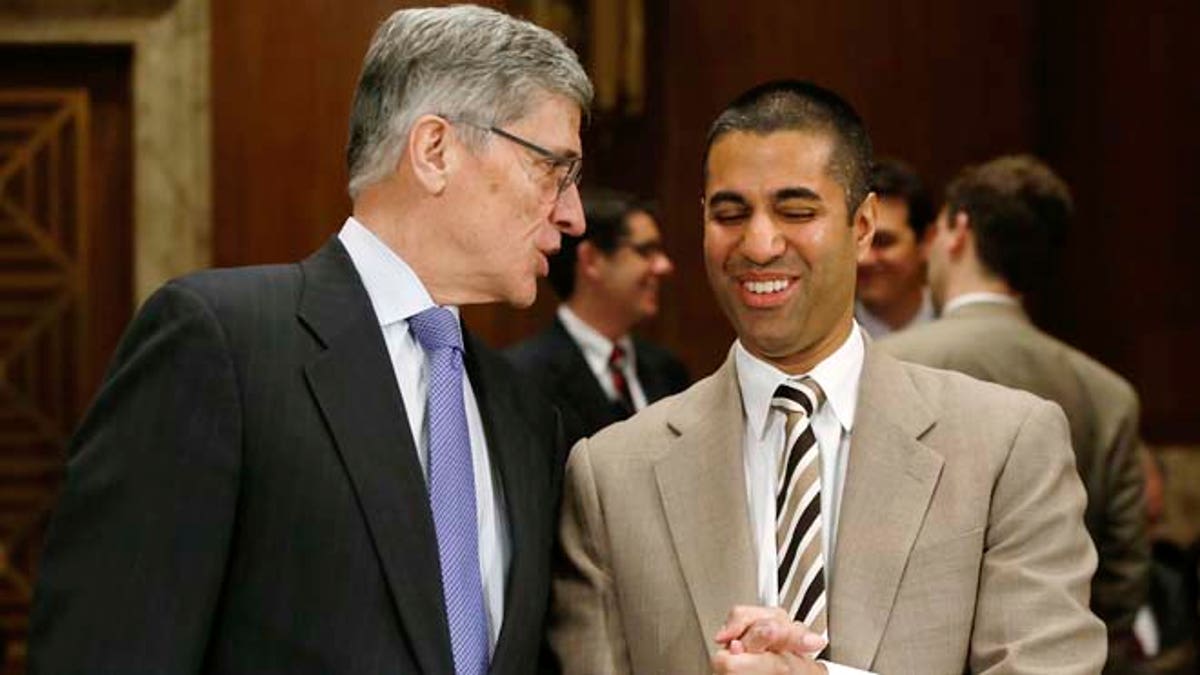
In this March 27, 2014 photo, Federal Communications Commission (FCC) Chairman Tom Wheeler, left, and FCC Commissioner Ajit Pai arrive to testify before a Senate subcommittee in Washington, D.C. (Reuters)
The two Republican members of the Federal Communications Commission are urging the Democratic chairman to delay a high-drama vote on a secret Internet regulation plan, with one warning the proposal would "impose rules upon almost every nut and bolt" of how Americans use the Internet.
The so-called net neutrality plan, which has not been made public, is scheduled for an FCC vote on Thursday.
After warning about the implications of the proposal for weeks, Republican Commissioners Ajit Pai and Mike O'Rielly made a last-minute, two-pronged appeal to the chairman on Monday: "immediately release" the 332-plan, and delay the vote for at least 30 days so the public can review it.
"With the future of the entire Internet at stake, it is imperative that the FCC get this right," they said in a joint statement. "And to do that, we must live up to the highest standards of transparency."
Chairman Tom Wheeler and others have previewed select parts of the plan ahead of the vote.
Wheeler describes it as an effort to prevent the Internet from being taken over by big business interests, and says the proposal would ensure an "open" Internet.
At its heart, the plan would expand the government's power to oversee Internet service providers and establish new rules to prohibit companies from blocking or slowing data. Open Internet rules had been in place but were recently knocked down by a federal court.
Wheeler's approach attempts to erase any legal uncertainty by reclassifying the Internet as a telecommunications service and regulating it much like telephones. The rules would apply to both wireless and wired services.
Wheeler and consumer groups say the move is necessary to prevent providers from creating slow or fast Internet lanes in which content companies like Netflix can pay to jump to the head of the queue.
But Republicans and industry officials warn of a slippery slope that would discourage investment and innovation.
Pai, in a joint Politico op-ed with Federal Election Commission member Lee Goodman, claimed that the "heavy-handed" plan would:
- Regulate broadband rates
- "Decree" whether companies can offer "consumer-friendly service plans" like unlimited access to streaming music
- Effectively "institutionalize innovation by permission," prompting companies to seek "advisory opinions" from the feds for business plans, "for fear of what will happen if they don't"
- Claim the power to force companies to "physically deploy broadband infrastructure"
- Allow trial lawyers to file class-action lawsuits for any alleged violations of this plan
The commissioners argued that the panel was conjuring the idea of "digital dysfunction" in order to "justify a public-sector power grab." They described this as part of a pattern -- with FEC members similarly discussing the possibility of regulating online political speech.
Meanwhile, The Hill reported that Democratic Commissioner Mignon Clyburn has asked Wheeler to scale back the plan, potentially putting the chairman in a tough spot ahead of the vote. But Clyburn's office refused to comment on potential changes before the vote "out of respect for the deliberative process," her office said Tuesday.
Wheeler, though, is pushing back on the calls for a delay and defending the proposal itself.
He tweeted that the future of the "open Internet" is at stake, and, "We cannot afford to delay finally adopting enforceable rules to protect consumers & innovators."
He also noted that the commission received "more than 4 million comments on #OpenInternet during past year that helped shape proposal."
"It's time to act," Wheeler tweeted.
Asked Tuesday about the call for a delay, an FCC spokesperson also told FoxNews.com that the 4 million comments amounted to an "unprecedented" level of public response.
"In accordance with long-standing FCC process followed in both Democratic and Republican administrations, Chairman Wheeler circulated his proposal to his fellow Commissioners for review three weeks before the scheduled vote. The Chairman has seriously considered all input he has received on this important matter, including feedback from his FCC colleagues," the spokesperson said.
Wheeler's plan is by any measure an aggressive leap in Internet regulation in an industry that has so far seen little government oversight. The proposal calls for treating Internet service like a public utility, although Wheeler has said he would not use the new regulations to tell broadband providers how much to charge customers, as the law would allow.
Industry is fighting this approach because it says it's only a matter of time before the rules grow more stringent and the FCC is regulating how much Internet providers can charge.
The FCC is likely to adopt the new rules if the vote proceeds as planned, considering the Democratic majority on the commission. But the next stop may be the courts. Industry lobbyists say it's likely that one of the major providers will sue and ask the court to suspend enforcement pending appeal.
The Associated Press contributed to this report.




